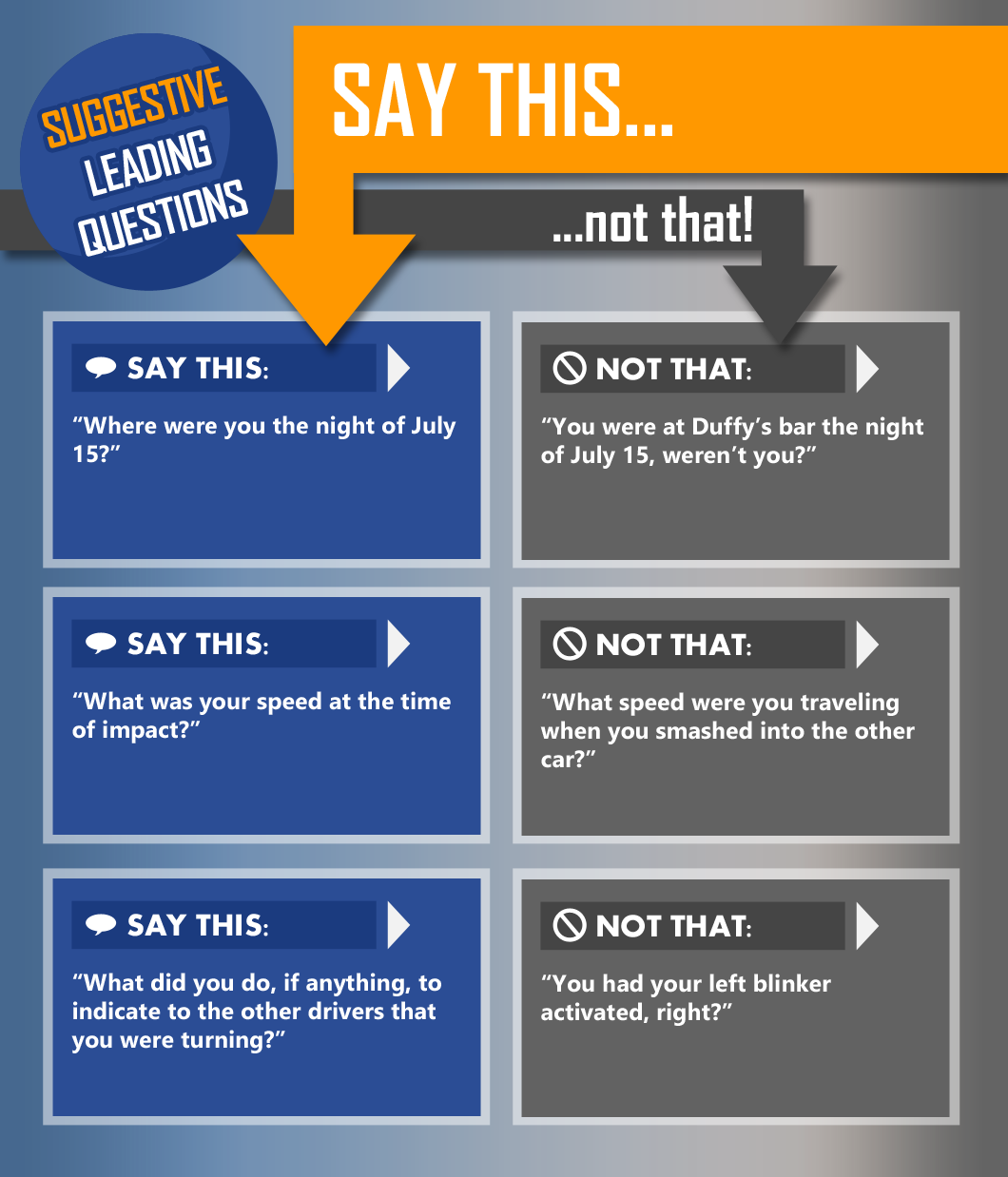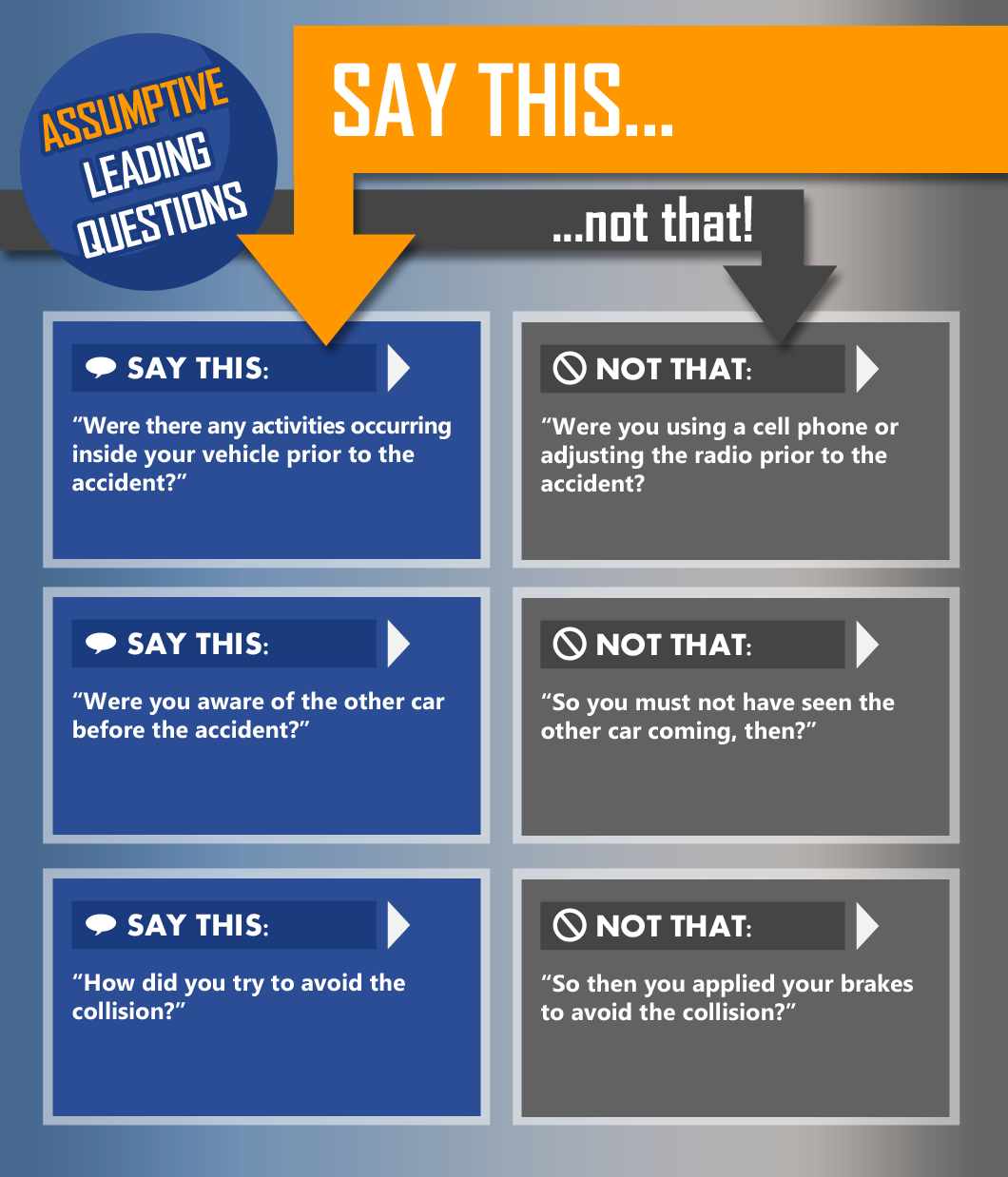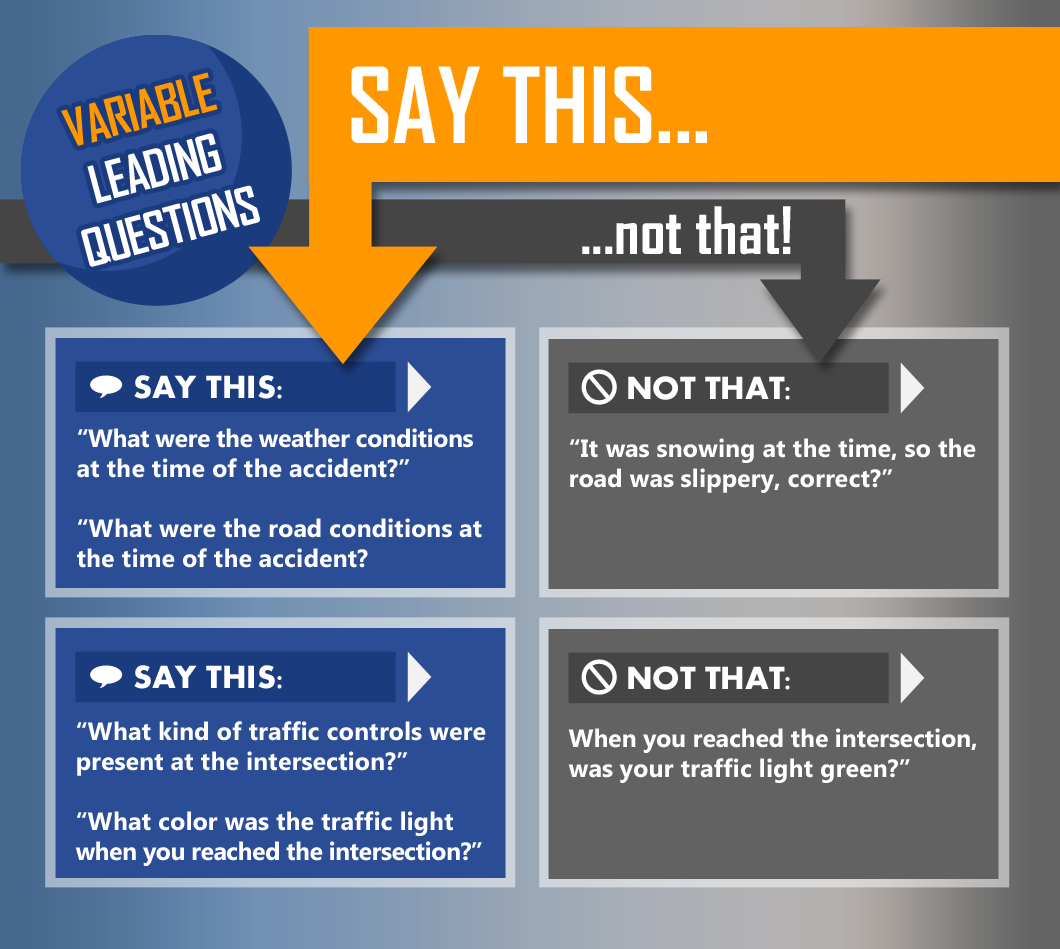To kick off our ACS blog, we’ve been shining a light on one of the fundamental aspects of claim handling: the recorded statement. There is an art to taking a quality recorded statement, and good statement takers share a common DNA. Insurance companies are constantly taking measures to make the claims process more efficient, but when it comes to reporting a loss, inefficiencies still exist. Some of these may come with mitigating circumstances, but others are 100% avoidable. One such inefficiency we come across many times in any given week: the adjuster who asks leading questions.
The danger of leading questions is tampering with the recollection of the interviewee, resulting in potentially skewed or distorted testimonies. That may seem like a lot of responsibility to heap on a single question, but it’s true! Research has shown very clearly that memory is easily susceptible to suggestion, and malleable enough to adjust to an outside source, even to the point of contradicting itself. We’ve collected three major types of leading questions that we see statement takers ask every day, and we’ve looked to research in the fields of psychology, law, and survey-taking to explain precisely how and why they so easily obscure a testimony. Are you guilty of asking any of these?
Leading Question #1: The Suggestion
Example: “You were at Duffy’s bar on the night of July 15, weren’t you?”
When you think of leading questions, this type is probably the first that comes to mind. This form of questioning plants the suggestion of the answer into the interviewee’s mind. These might be overtly expressed expectations or subtle changes in language that subconsciously influence the interviewee’s answer.
Coercive addenda tacked onto your question, like in the question above, are probably the least subtle and easiest excised of all leading questions. Ending a question with “weren’t you?” is a pretty clear indicator of what you expect the answer to be. Unfortunately, revealing your expectation of the answer to a question can lead to warping the accuracy of the response. Acquiescence bias can make interviewees feel an impulse to answer a question in the affirmative, sometimes even despite contradictory statements they had made prior.
Some research on acquiescence bias suggests that this impulse may come from our brains possessing a bias towards recalling supporting information and ignoring contradictory information, while some argue it is part of a social interaction intended to please the interviewer. Whatever the reason, the result can be quite powerful. In a recorded statement, a question like “You got back at 3:00, correct?” could cause a person to answer in the affirmative, even if they remember it as 2:45. This could be due to the power of suggestion causing them to think that they were not remembering correctly, and it was 3:00; or possibly because they deem the difference in their memory and your suggestion being too little to dispute. It is possible that as the details of the case coalesce, the precise time becomes an important fact, and your leading question has now derailed your ability to get their unaltered recollection.
It should be relatively easy to eliminate asking leading questions with such obvious suggestions. But what about when the suggestions are implied? A study by psychologist Elizabeth Loftus found that students who had just witnessed film of car accidents reported various rates of speed based on the verb the interviewer used in their question. Students reported lower speeds when the cars were described as “contacted” and higher speeds when the cars were described as having “collided” or “crashed.” Claimants will use the language this way, too: I’ve transcribed a number of three-car accidents where the middle car describes the car behind them as “smashing” into them, while their interaction with the car ahead took on more of a “tap” or a “bump”! The fact is that the cars made contact – the verbiage used to describe that contact could be nothing more than a bias of one’s best interest.
The world of survey-taking – another field where getting efficiently to the truth has great value – has to deal with eliminating these subtle suggestions all the time. For instance, the question “What do you like about X?” implies that the interviewer believes there is something to like about X, while for the respondent the most true answer might be “Nothing.” However, the implication in the question makes receiving that answer less likely. “What, if anything, do you like about X?” is a better question, because it allows for all possible responses.

Leading Question #2: Unconfirmed Details
Example: “Were you speeding because you were running late from work?”
The second kind of leading question is not altogether unlike the first, but instead of implying the manner in which you expect the interviewee to answer, you instead imply details that are unconfirmed or assumed. This can lead to a response that is skewed, or outright false.
An Australian study tasked police with asking children questions regarding an event that had happened in the school one week prior. Before the interviews, officers were provided with details that were both accurate and inaccurate. Here, questions that were posed as though an activity had occurred, when in fact it had not, elicited false narratives from the children, and hindered the officers in recreating a factual retelling of the case.
Offering your assumptions can provide the same problems with an interviewee’s narrative. For instance, in a claim involving an accident on a city street intersection, where a claimant had mentioned tall trucks parked on one side of the street, you might assume that those tall trucks had impeded the claimant’s view into the intersection. That may be the case. However, it also may not – the claimant may have been distracted by something happening in a crosswalk, or may have been trying to beat a light. Even if the claimant’s view was impeded by the trucks, it could be only a partial cause to the accident. Those other details could be missed if you asked a broad, assumptive question like, “Were the trucks on the side of the road why you hit that car?” It would be much better to first establish whether the trucks had been an impediment at all.
A 1982 study called “Where Leading Questions Can Lead: The Power of Conjecture in Social Interaction” examined responses from interviewees who were asked questions regarding attributes they either did or did not possess. The study found, incredibly, that whether the respondents possessed the attributes was almost a non-issue; respondents accepted the premises of the questions a shocking 97% of the time! Conjecture in leading questions can have a powerful effect in reshaping narratives in an interviewee’s mind, and in our efforts to establish the facts of an event, should be avoided as much as possible.

Leading Question #3: Too Many Variables
Example: “Is Main Street a two-way street with two lanes?”
The third type of leading question that we come across in recorded statement taking is the question that really isn’t one question, it’s two or three being asked at the same time. The question above is an example of this kind of leading question. It has two parts and yet can be answered in the form of a single “Yes” or “No” – making it reasonable for someone reviewing the statement to doubt whether their answer is meant for one of the variables or both, especially if it is contradicted elsewhere.
Often, an interviewee posed with a question with too many variables will answer according to the variable which they deem more consequential. A claimant might answer “Yes” to the question “So you slipped on some water and fell and hurt your knee?” because their knee was in fact what they fell on, even if the liquid in question was not water. This could become an important detail later. Since the interviewer got a yes on that question, they might believe that all parts of that question are indeed facts, and move on. It’s much clearer, and much more efficient, to separate the questions into their respective parts and ask each part as a separate question.

How Can You Avoid Asking Leading Questions?
Eliminating leading questions is an essential skill for statement takers to develop, and when mastered, can save considerable time and hassle. But when we talk about eliminating bad habits, it’s always good to also point out the good habits they should be replaced with. Here are three recommendations to follow to become a more efficient statement taker.
1. Ask “open-ended questions” to draw out recollection.
Asking non-leading open-ended questions will allow you to establish what the interviewee remembers about the event. Memory of an event erodes with time and is highly susceptible to suggestion, so asking an open-ended question will keep you from unintentionally tampering with their memory.
Example: “Please describe the events of the five minutes leading up to your injury.”
2. Ask single-variable “closed” questions to confirm information.
Often, you will need to focus in on something an interviewee has said, or establish a fact they have not yet touched upon. Ask questions that are simple, concise, and are attempting to account for only one variable. These will either be “yes” or “no” questions, or questions with simple answers that will clearly confirm or eliminate parts of the event.
Example: “You mentioned a traffic light. What color was the light when you entered the intersection?”
3. Follow a template (and ensure that template is free from leading questions.)
A clean, organized, and effective template can help you keep the interview on track and completed in a timely manner without bypassing any details. Templates should be specific to the type of claim, follow a logical path, and be constructed in a manner that mitigates unnecessary detours. As a statement taker, you should be familiar with the template beforehand so that you are comfortable and natural in guiding the interview.
Your Next Steps
Eliminating leading questions from your interviews isn’t something that happens right away, so don’t despair! Feel free to bookmark this page and return to it anytime you improve on a way to ask a question. Or better yet, ask us! If you find yourself asking a question that you feel may be misleading your interviewees, send us a Tweet (@acsacc). Maybe we can help!
